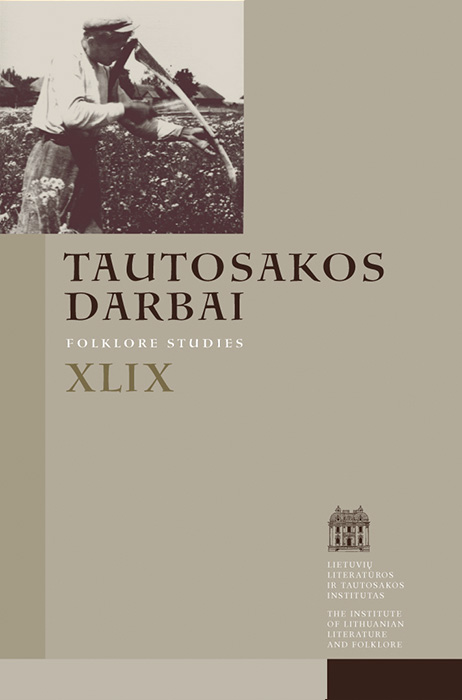Local Folk Memory in Literary Fiction: the Case of Pasvalys Region
Abstract
The aim of the article is to examine how and to what extent folk memory is reflected in the Lithuanian literary prose. The search is narrowed regionally: the analysis focuses solely on the texts related to a definite locality – Pasvalys region, the native place of the author. Three pieces of literary fiction by three authors born in this region are selected: their stories also take place in this region or somewhere nearby. The author of the article attempts recognizing the imprints of the folkloric culture left in the literary texts, which may be rather deep or barely visible. Both the local and the more universal nature of the folklore or related cultural phenomena that left these marks are taken into consideration. While reading the books, a rather true-to-life version of the traditional culture existing in the Pasvalys region opens up, along with its historically shaped notion. The attitude adopted by the writers towards the fragments of the folkloric culture that they describe is examined, as well as its contemporary reception by the people recognizing the local culture, particularly those tracing their origins in it. The folkloric landscape transferred into the fictional narrative is discussed against the background of the place legends; and the specific situation of this region, namely, its close proximity to Latvia and certain peculiarities of its landscape are also paid attention to. Interestingly enough, the old customs and beliefs (both the ones typical exclusively to the Pasvalys region and the numerous ones encountered much more broadly) are abundantly reflected in the fiction; quite frequently their modernized variants are incorporated into the texts. These include rituals practiced during the calendar festivals, e.g. sprinkling each other with water at Shrovetide, and other community and family traditions, particularly those involving rather vivid descriptions of the local wedding scenario. The local food tradition (made increasingly relevant nowadays) also earns special attention from the writers. The author of the article particularly considers relics of the worldview inherited from the folk belief legends and the renderings of the local verbal lore. The field of investigation of the folk memory readily incorporates the linguistic code representing the local peculiarities: the dialect, particularly its lexical aspect. The process of individual re-creation of proverbs or old onomatopoeic texts in order to revitalize their tradition is also noted.
The analysis of the regionally limited literary discourse allows asserting the possibility of interpreting fiction as still barely utilized source of folk memory, which nevertheless quite often articulates the local folk culture almost as precisely as the registers of traditional culture compiled by specialists as result of detailed scholarly fieldwork.
Downloads
Most read articles by the same author(s)
- Bronė Stundžienė, From the Soviet Folksong Research: Between Free Choice and Obligation , Tautosakos darbai: Vol. 65 (2023): Tautosakos darbai
- Bronė Stundžienė, Folk Couplets against the Background of Historical Memory , Tautosakos darbai: Vol. 63 (2022)
- Živilė Ramoškaitė, Bronė Stundžienė, Looking at the Horizons of Folksong Research. Živilė Ramoškaitė interviewing Bronė Stundžienė , Tautosakos darbai: Vol. 64 (2022)
- Bronė Stundžienė, Regarding Expressions of Landscape in Folksongs , Tautosakos darbai: Vol. 47 (2014)
- Bronė Stundžienė, Called by Folksongs: A Book on a Folklore Ensemble , Tautosakos darbai: Vol. 57 (2019)
- Bronė Stundžienė, The Lithuanian Folk Couplets: On This Side of the Permissible Laughter and Beyond , Tautosakos darbai: Vol. 59 (2020)
- Bronė Stundžienė, The Folksong Narrative of the Family: Ritual Exposures and the Meaning of Shifting Contexts , Tautosakos darbai: Vol. 51 (2016)
- Bronė Stundžienė, Traces of Time in the History of Editing the Book of Lithuanian Folk Songs , Tautosakos darbai: Vol. 61 (2021)
- Bronė Stundžienė, Turning to the Beginning of the Lithuanian Folksong Publication , Tautosakos darbai: Vol. 56 (2018)
- Bronė Stundžienė, Rita Černiauskienė, Experiencing Ethnology while at School , Tautosakos darbai: Vol. 57 (2019)
